-
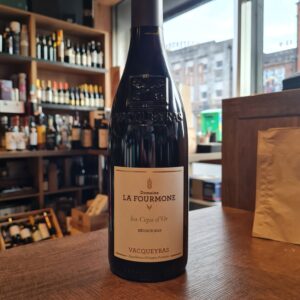 Domaine la Fourmone is a multi-generational domaine and is currently run by sister, Florentine and brother, Albin Combe. The property dates back to the mid-1700’s when it originally producing wheat. Wine began to be grown in the last 19th century and thent became the crop after Julien Combe purchased the property in 1910. The domaine cultivates 41 ha (104 acres) of vineyards of which, 20ha are in Vacqueyras, 10ha are in Gigondas and 7ha of Côtes-du-Rhône and IGP and 4ha of vines on the southern edge of the Dentelles hills that reside in the Ventoux appellation. “Les Ceps d’Or” comes from a blend of mainly Grenache and Mourvèdre. It expresses the imprint of the 50 years of our goblet-pruned vines. The berries are delicately harvested on the northern and eastern limits of the Vacqueyras appellation. The plots come from two islands located on the plateau of the appellation at the foothills of the Dentelles de Montmirail, a massif well known for its geological richness. The first islet is located in the Piedmont de Beauregard region. The soil is made up of dark beige marly silts, cut by broken slabs of Miocene molasses at a depth of one meter. This terroir requires a lot of effort from the vines to slide their rootlets into the cracks and deploy meters of roots. This effort gives the wine a singular complexity and aromatic richness. The second islet is located at the northern limit of the Cône de la Font des Papes terroir. A surface of light beige clay-sandy silt with small limestone fragments with a well-developed root profile up to two meters deep. The materials from this terroir have all the criteria favorable to the vine: freshness and good water reserve.
Domaine la Fourmone is a multi-generational domaine and is currently run by sister, Florentine and brother, Albin Combe. The property dates back to the mid-1700’s when it originally producing wheat. Wine began to be grown in the last 19th century and thent became the crop after Julien Combe purchased the property in 1910. The domaine cultivates 41 ha (104 acres) of vineyards of which, 20ha are in Vacqueyras, 10ha are in Gigondas and 7ha of Côtes-du-Rhône and IGP and 4ha of vines on the southern edge of the Dentelles hills that reside in the Ventoux appellation. “Les Ceps d’Or” comes from a blend of mainly Grenache and Mourvèdre. It expresses the imprint of the 50 years of our goblet-pruned vines. The berries are delicately harvested on the northern and eastern limits of the Vacqueyras appellation. The plots come from two islands located on the plateau of the appellation at the foothills of the Dentelles de Montmirail, a massif well known for its geological richness. The first islet is located in the Piedmont de Beauregard region. The soil is made up of dark beige marly silts, cut by broken slabs of Miocene molasses at a depth of one meter. This terroir requires a lot of effort from the vines to slide their rootlets into the cracks and deploy meters of roots. This effort gives the wine a singular complexity and aromatic richness. The second islet is located at the northern limit of the Cône de la Font des Papes terroir. A surface of light beige clay-sandy silt with small limestone fragments with a well-developed root profile up to two meters deep. The materials from this terroir have all the criteria favorable to the vine: freshness and good water reserve. -
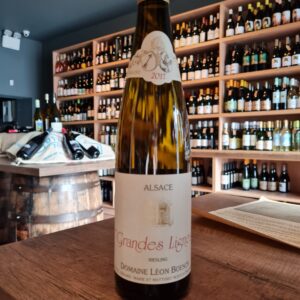 The Boesch domaine is located within the Vallèe Noble, in the “Ballons des Vosges” natural park. A magical place, surrounded by splendid vineyards at the foot of the two highest mountains of the Vosges range. The Boesch family has lived there and worked the land since 1640. 25 year old biodynamic vines planted in a limestone and sandstone-clay soil on an east facing hillside give this delicious wine. This wine is the subject of evident care: ploughing, natural treatments, and the vines are fertilized with compost produced on the estate. The harvest, the highlight of the year, is carried out exclusively by hand, and fermentation takes place with indigenous yeasts in oak casks. The nose is characterized by rhubarb, apricot, anise and gingerbread. On the palate it is very clean. Definitely a great Riesling.
The Boesch domaine is located within the Vallèe Noble, in the “Ballons des Vosges” natural park. A magical place, surrounded by splendid vineyards at the foot of the two highest mountains of the Vosges range. The Boesch family has lived there and worked the land since 1640. 25 year old biodynamic vines planted in a limestone and sandstone-clay soil on an east facing hillside give this delicious wine. This wine is the subject of evident care: ploughing, natural treatments, and the vines are fertilized with compost produced on the estate. The harvest, the highlight of the year, is carried out exclusively by hand, and fermentation takes place with indigenous yeasts in oak casks. The nose is characterized by rhubarb, apricot, anise and gingerbread. On the palate it is very clean. Definitely a great Riesling. -
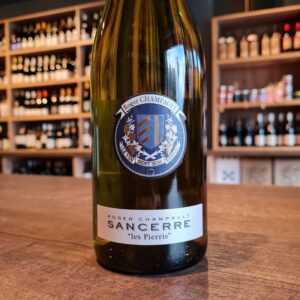 Five generations of traditional winemaking from the estate of Roger Champault, modern thermoregulation techniques, and carefully chosen soil matching, have produced a Cuvee that is subtle at first, like the rising of a summer breeze, building in its complexity with wispy herbal notes and abundant florals that dance across the taste buds like wind through an apple orchard. Delicate, yet so very alive. This wine drinks with a lovely, masterfully structured liveliness and sweet, concentrated finish.Thanks to its abundant fruitiness, it is suitable not only for seafood and crabs but also for more abundant fish dishes; fried salmon, pike perch etc. Also suitable for light meat, especially poultry dishes.Curious note, Sancerre Les Pierris 2008 wine was served at the wedding dinner of Princess Victoria and Daniel of Sweden.
Five generations of traditional winemaking from the estate of Roger Champault, modern thermoregulation techniques, and carefully chosen soil matching, have produced a Cuvee that is subtle at first, like the rising of a summer breeze, building in its complexity with wispy herbal notes and abundant florals that dance across the taste buds like wind through an apple orchard. Delicate, yet so very alive. This wine drinks with a lovely, masterfully structured liveliness and sweet, concentrated finish.Thanks to its abundant fruitiness, it is suitable not only for seafood and crabs but also for more abundant fish dishes; fried salmon, pike perch etc. Also suitable for light meat, especially poultry dishes.Curious note, Sancerre Les Pierris 2008 wine was served at the wedding dinner of Princess Victoria and Daniel of Sweden. -
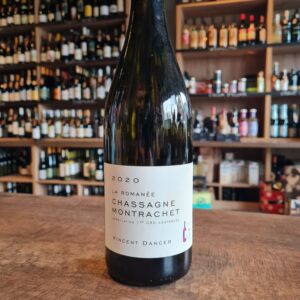 Vincent Dancer grew up in Alsace, where he inherited a love of wine and photography from his father. After studying engineering, his father suggested that Vincent spend some time in Burgundy, where his family owned some vines that were being rented out to cousins. Dancer was immediately hooked, and decided to settle in Chassagne-Montrachet and make wine from the five hectares of well-situated vineyards. The winery is small even by the standards of Burgundy, and despite Dancer’s reclusive nature, the wines are well known to a small circle of restaurateurs and wine-lovers who reliably take their miniscule allocation year after year. Dancer was the first producer in Chassagne to become certified organic, and there remains less than a handful of others. He is quietly individualistic, creating his own lean, bright, and savory style of wines, trusting his instincts and experience to make the best possible wine in his own way. Each cuvée, however, is truly a reflection of the terroir—from the rich, unctuous Meursault Perrières to the incisively fresh Chassagne Tête du Clos. It is not an exaggeration to say that the wines from Vincent Dancer are majestically unique, exceptionally delicious, and well worth the effort of seeking out.
Vincent Dancer grew up in Alsace, where he inherited a love of wine and photography from his father. After studying engineering, his father suggested that Vincent spend some time in Burgundy, where his family owned some vines that were being rented out to cousins. Dancer was immediately hooked, and decided to settle in Chassagne-Montrachet and make wine from the five hectares of well-situated vineyards. The winery is small even by the standards of Burgundy, and despite Dancer’s reclusive nature, the wines are well known to a small circle of restaurateurs and wine-lovers who reliably take their miniscule allocation year after year. Dancer was the first producer in Chassagne to become certified organic, and there remains less than a handful of others. He is quietly individualistic, creating his own lean, bright, and savory style of wines, trusting his instincts and experience to make the best possible wine in his own way. Each cuvée, however, is truly a reflection of the terroir—from the rich, unctuous Meursault Perrières to the incisively fresh Chassagne Tête du Clos. It is not an exaggeration to say that the wines from Vincent Dancer are majestically unique, exceptionally delicious, and well worth the effort of seeking out. -
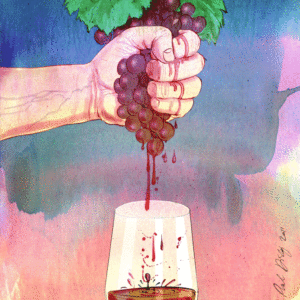 More and more wine producers are adopting organic winemaking as the way forward, and they are stunning wines out there. There are many reasons why people enjoy organic wines. For some, it became a way of life, for others it just “feels right”. The old fear ''I don't trust organic wines'' or ''They all taste the same'' is disappearing, with more people converting to organic wines as there is more knowledge, greater quality and a heavily regulated market that will certify these wines. We brought you a case for any occasion with easy drinking 6 bottles. They say natural wine can be tricky to understand, well no expertise needed with these wines. An essential mix of light, low sulphite, crisp fresh white and a soft, pleasurable red. All organic, all vegan, all tasty. No need to drown in the complexity of natural wine, just try these and enjoy. Bardos Rueda Verdejo - This artisan verdejo is part of the reason the Spanish Rueda region has become quite popular. Made unapologetically, you will find yourself like a true “Bard” drinking this wine. Delicious! Sepp Gruner Veltliner - All Sepp Moser wines have been organic (and all estate wines biodynamic) since 2007. Delicate aromas of pear, kiwi, apricot and white spice. On the palate stone fruit flavours and white pepper lead to a gently textured, mineral and citrus finish. Combel La Serre L'Epatant Antidote Rosé - 100% French Malbec (known in Cahors as Auxerrois). The vines are 40 years old, grown on clay and limestone soils. Fermentation and aging take place in small tanks."The Splendid Antidote to the Heat of the Causse" is the amusing and appropriate name of this refreshing rosé. (The Causse is the high limestone plateau around Cahors, which gets brutally hot in the summer.) The wine shows a pretty pink/orange color and aromas of ripe cherry, raspberry and cassis with citrus and spice. It precedes a palate that is both fleshy, suave and savory, with formidable gluttony. Both easy and winey, it's an absolute delight! Roche-Audran, ‘Nature’ Còtes-du-Rhône - Vincent Rochette comes from a long line of grape growers rather than winemakers up until 1998 when he bucked that trend by investing in a cellar and the necessary equipment to allow him to vinify his own grapes . He uses only natural products in the vineyard and carries out all his work in keeping with the cosmic cycles of the earth, not only among the vines but also in the cellar. One of his most interesting cuvées is the Côte du Rhone ‘Nature’, which has had no sulphites added at any stage of the winemaking process. Due to the fact that sulphites are naturally present in grapes, there are still 9mg present (below the legal 10mg limit which is required to state that the wine contains sulphites), an insignificant figure compared to the conventional levels found in most wines. The result is a wine that is simply a pure expression of Grenache, Carignan, Syrah and Mourvèdre. Harvesting, racking and bottling are all carried out in accordance with cosmic rhythms. Pitti Pittnauer Red - High on the hills of Austria there is more than just a lonely goat herd – there is also a fantastic winery, considered one of the country’s best. Pittnauer has a long winemaking tradition in the region, and in 2006 moved to more biodynamic practices. The results are delicious, environmentally friendly wines with years of experience behind them. Now prepare yourself for some varieties you’ve probably never heard of – Pittnauer’s Pitti Red Blend is made from blaufränkisch and Zweigelt grapes with a small quantity of Merlot added to the mixture. Filipa Pato Dinâmica Baga 2019 - Filipa Pato is the confirmation of the old saying "son of fish knows how to swim". Although she followed the footsteps of her father Luís Pato, Filipa went on her own and started a project in 2001. The success was immediate, and soon she rose to the status of one of the most brilliant winemakers in Portugal. Her wines are the result of Filipa's innovative and brilliant spirit. They were quickly at the forefront of national and international criticism. Dinâmica Baga is a wine that, due to its proximity to the sea, presents an intense, complex and elegant aroma with a touch of fruit such as strawberry and plum, nuances of liquorice and notes of spices such as black pepper, bay leaves and thyme, and balanced acidity. In the mouth it is fruity, with a beautiful structure and velvety texture, with a very fresh and inviting finish.
More and more wine producers are adopting organic winemaking as the way forward, and they are stunning wines out there. There are many reasons why people enjoy organic wines. For some, it became a way of life, for others it just “feels right”. The old fear ''I don't trust organic wines'' or ''They all taste the same'' is disappearing, with more people converting to organic wines as there is more knowledge, greater quality and a heavily regulated market that will certify these wines. We brought you a case for any occasion with easy drinking 6 bottles. They say natural wine can be tricky to understand, well no expertise needed with these wines. An essential mix of light, low sulphite, crisp fresh white and a soft, pleasurable red. All organic, all vegan, all tasty. No need to drown in the complexity of natural wine, just try these and enjoy. Bardos Rueda Verdejo - This artisan verdejo is part of the reason the Spanish Rueda region has become quite popular. Made unapologetically, you will find yourself like a true “Bard” drinking this wine. Delicious! Sepp Gruner Veltliner - All Sepp Moser wines have been organic (and all estate wines biodynamic) since 2007. Delicate aromas of pear, kiwi, apricot and white spice. On the palate stone fruit flavours and white pepper lead to a gently textured, mineral and citrus finish. Combel La Serre L'Epatant Antidote Rosé - 100% French Malbec (known in Cahors as Auxerrois). The vines are 40 years old, grown on clay and limestone soils. Fermentation and aging take place in small tanks."The Splendid Antidote to the Heat of the Causse" is the amusing and appropriate name of this refreshing rosé. (The Causse is the high limestone plateau around Cahors, which gets brutally hot in the summer.) The wine shows a pretty pink/orange color and aromas of ripe cherry, raspberry and cassis with citrus and spice. It precedes a palate that is both fleshy, suave and savory, with formidable gluttony. Both easy and winey, it's an absolute delight! Roche-Audran, ‘Nature’ Còtes-du-Rhône - Vincent Rochette comes from a long line of grape growers rather than winemakers up until 1998 when he bucked that trend by investing in a cellar and the necessary equipment to allow him to vinify his own grapes . He uses only natural products in the vineyard and carries out all his work in keeping with the cosmic cycles of the earth, not only among the vines but also in the cellar. One of his most interesting cuvées is the Côte du Rhone ‘Nature’, which has had no sulphites added at any stage of the winemaking process. Due to the fact that sulphites are naturally present in grapes, there are still 9mg present (below the legal 10mg limit which is required to state that the wine contains sulphites), an insignificant figure compared to the conventional levels found in most wines. The result is a wine that is simply a pure expression of Grenache, Carignan, Syrah and Mourvèdre. Harvesting, racking and bottling are all carried out in accordance with cosmic rhythms. Pitti Pittnauer Red - High on the hills of Austria there is more than just a lonely goat herd – there is also a fantastic winery, considered one of the country’s best. Pittnauer has a long winemaking tradition in the region, and in 2006 moved to more biodynamic practices. The results are delicious, environmentally friendly wines with years of experience behind them. Now prepare yourself for some varieties you’ve probably never heard of – Pittnauer’s Pitti Red Blend is made from blaufränkisch and Zweigelt grapes with a small quantity of Merlot added to the mixture. Filipa Pato Dinâmica Baga 2019 - Filipa Pato is the confirmation of the old saying "son of fish knows how to swim". Although she followed the footsteps of her father Luís Pato, Filipa went on her own and started a project in 2001. The success was immediate, and soon she rose to the status of one of the most brilliant winemakers in Portugal. Her wines are the result of Filipa's innovative and brilliant spirit. They were quickly at the forefront of national and international criticism. Dinâmica Baga is a wine that, due to its proximity to the sea, presents an intense, complex and elegant aroma with a touch of fruit such as strawberry and plum, nuances of liquorice and notes of spices such as black pepper, bay leaves and thyme, and balanced acidity. In the mouth it is fruity, with a beautiful structure and velvety texture, with a very fresh and inviting finish. -
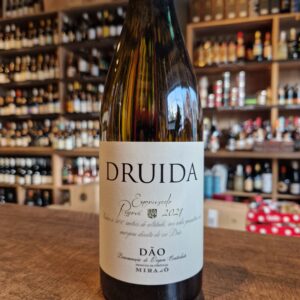 Mira do O produces expressive, concentrated wines. Despite the concentration, all the wines are fresh, elegant, well-balanced and shows great maturation potential. Dao region is valued by wine lovers for its expressiveness, freshness, concentration of taste and longevity of the wine. The region is a little further away from the Atlantic Ocean, but its cold winds still cool Dao vineyards. For this reason, the wine is high levels of acidity and great balance. The poor granite soil prevalent in the region gives the wines more texture, depth and spice. It is worth mentioning that here is a register and a large part of the old, local Portuguese grapes. Mira do O Druida Encruzado Reserva is made from a small vineyard located on a 500-meter plateau. This plateau provides protection from excess Atlantic moisture. At the same time, the temperature fluctuations caused by this altitude allow the grapes to ripen perfectly during the day, but they are more refreshing due to the cooling vineyards. The winemaker follows the principle of minimalist intervention: to change the wine as little as possible during its production. For this reason, the very characteristics of the grape stand out. Pair it with aperitif, roast white meats, sautee greens
Mira do O produces expressive, concentrated wines. Despite the concentration, all the wines are fresh, elegant, well-balanced and shows great maturation potential. Dao region is valued by wine lovers for its expressiveness, freshness, concentration of taste and longevity of the wine. The region is a little further away from the Atlantic Ocean, but its cold winds still cool Dao vineyards. For this reason, the wine is high levels of acidity and great balance. The poor granite soil prevalent in the region gives the wines more texture, depth and spice. It is worth mentioning that here is a register and a large part of the old, local Portuguese grapes. Mira do O Druida Encruzado Reserva is made from a small vineyard located on a 500-meter plateau. This plateau provides protection from excess Atlantic moisture. At the same time, the temperature fluctuations caused by this altitude allow the grapes to ripen perfectly during the day, but they are more refreshing due to the cooling vineyards. The winemaker follows the principle of minimalist intervention: to change the wine as little as possible during its production. For this reason, the very characteristics of the grape stand out. Pair it with aperitif, roast white meats, sautee greens -
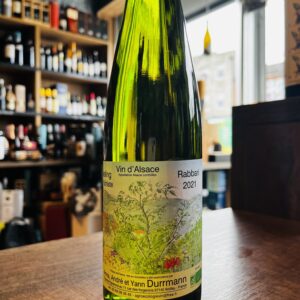 This wine is imported directly and only for Pinto Wines Riesling on Schist makes its terroir apparent with a livewire acidity and snap, rocky, chalky and mineral. Low yielding parcels. Long and driving, a little structure from 2022. The Durrmann family are making wine from their old family house in the middle of Andlau, a beautiful village nestled on the first slopes of the Vosges mountains south-west of Strasbourg. With a surface of only 1,5 hectare at the beginning in 1979, the domaine gradually reached a total surface of seven hectares after André decided to move back to farming and pieced it together from abandoned vineyard sites that were hard to work and no longer commercially viable, coming from his grandfather who made shoes to supplement the farm income. This lack of an established and family-based wine making tradition initially presented a weakness because the whole business had to be built, but it is also a strength because the company wasn’t limited to traditional customs, and therefore has always been oriented toward innovation. The vineyards are now scattered on about 30 spots around the village. They added parcels progressively when opportunities showed up and looked also for different soil qualities so that the cuvées express several terroirs. The Durrmans think that the quality of the wine is created by the work in the vineyard, that’s why their objective is its preservation. The wines are being disturbed as little as possible. They do not add any oenological product to change the natural taste of the wines. The production is partly vinified in inox tank and partly in old wooden casks. Son Yann has worked in the domaine since he was a child and officially took over the running of the business a year ago. André was among the first wave of organic winemakers in Alsace converting in 1998, Yann has then taken this a step further applying a more natural approach in the cellar. Selected cuvées are produced without sulfur addition since 2007. The Durrmanns are true eco warriors only having electric cars and using solar energy for hot water and heating. Pair it with Pork, Seafood, Curries, Spicy dishes
This wine is imported directly and only for Pinto Wines Riesling on Schist makes its terroir apparent with a livewire acidity and snap, rocky, chalky and mineral. Low yielding parcels. Long and driving, a little structure from 2022. The Durrmann family are making wine from their old family house in the middle of Andlau, a beautiful village nestled on the first slopes of the Vosges mountains south-west of Strasbourg. With a surface of only 1,5 hectare at the beginning in 1979, the domaine gradually reached a total surface of seven hectares after André decided to move back to farming and pieced it together from abandoned vineyard sites that were hard to work and no longer commercially viable, coming from his grandfather who made shoes to supplement the farm income. This lack of an established and family-based wine making tradition initially presented a weakness because the whole business had to be built, but it is also a strength because the company wasn’t limited to traditional customs, and therefore has always been oriented toward innovation. The vineyards are now scattered on about 30 spots around the village. They added parcels progressively when opportunities showed up and looked also for different soil qualities so that the cuvées express several terroirs. The Durrmans think that the quality of the wine is created by the work in the vineyard, that’s why their objective is its preservation. The wines are being disturbed as little as possible. They do not add any oenological product to change the natural taste of the wines. The production is partly vinified in inox tank and partly in old wooden casks. Son Yann has worked in the domaine since he was a child and officially took over the running of the business a year ago. André was among the first wave of organic winemakers in Alsace converting in 1998, Yann has then taken this a step further applying a more natural approach in the cellar. Selected cuvées are produced without sulfur addition since 2007. The Durrmanns are true eco warriors only having electric cars and using solar energy for hot water and heating. Pair it with Pork, Seafood, Curries, Spicy dishes -
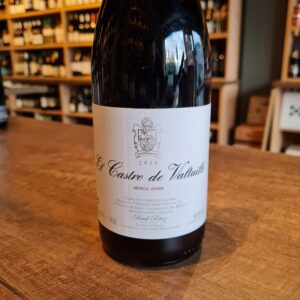 The Castro Ventosa estate was founded by the Perez family in 1752 and has been in the family ever since. They own 75 hectares of Mencía vines in Bierzo, making them the biggest owners of this varietal within the D.O Bierzo. For this wine, younger vines are used from 17 parcels across the Valtuille de Abajo village zone. Vines range from 20-40 years and viticulture is conventional, everything is done by hand and vines are not irrigated. Pair it with hard cheese, pasta, red meat, roasted vegetables.
The Castro Ventosa estate was founded by the Perez family in 1752 and has been in the family ever since. They own 75 hectares of Mencía vines in Bierzo, making them the biggest owners of this varietal within the D.O Bierzo. For this wine, younger vines are used from 17 parcels across the Valtuille de Abajo village zone. Vines range from 20-40 years and viticulture is conventional, everything is done by hand and vines are not irrigated. Pair it with hard cheese, pasta, red meat, roasted vegetables. -
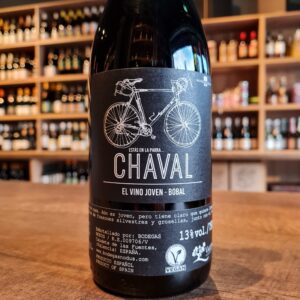 Young red wine with very fruity notes from the bobal. 100% organic wine with Vegan certification. Monitoring of maturation to determine the optimal time of harvest. Selection of grapes, controlled fermentation at low temperature and long maceration in stainless steel tanks. It came with very fruity notes from the bobal. Try it with pizza; couscous, rocket, roasted squash and spicy yogurt; or roast lamb.
Young red wine with very fruity notes from the bobal. 100% organic wine with Vegan certification. Monitoring of maturation to determine the optimal time of harvest. Selection of grapes, controlled fermentation at low temperature and long maceration in stainless steel tanks. It came with very fruity notes from the bobal. Try it with pizza; couscous, rocket, roasted squash and spicy yogurt; or roast lamb. -
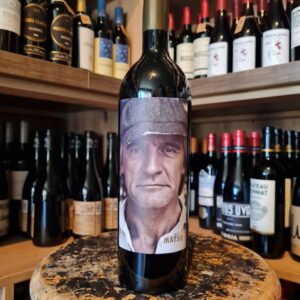 “El Recio translates as 'tough guy' and it's a clue to the style of this Tempranillo from Spain's Toro region. Made from old vines, cultivated biodynamically, the wine matures in new French oak for 14 months, giving it polish and opulence. Firm, sweet black fruit, almost fruit cake in character, with earthy and coffee notes. The guy in the picture must be a meat-eater – this wine is crying out for a juicy steak
“El Recio translates as 'tough guy' and it's a clue to the style of this Tempranillo from Spain's Toro region. Made from old vines, cultivated biodynamically, the wine matures in new French oak for 14 months, giving it polish and opulence. Firm, sweet black fruit, almost fruit cake in character, with earthy and coffee notes. The guy in the picture must be a meat-eater – this wine is crying out for a juicy steak -
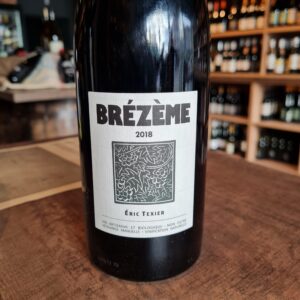 The 2019 Cotes du Rhone Brézème is a big, well structured wine that retains the freshness and lively character always present in this cuvee. The wine was vinified naturally, without added sulfur. The wine shows vivid aromas of blackberry and black cherry with hints of musk, blueberry, earth and citrus. The palate is deep and textured with earthy black fruits, bitter chocolate and mineral flavours, quite pure and long. Serve now, slightly chilled, with grilled meats, tagines and full-flavored cheeses, or cellar fo five to ten years or more.
The 2019 Cotes du Rhone Brézème is a big, well structured wine that retains the freshness and lively character always present in this cuvee. The wine was vinified naturally, without added sulfur. The wine shows vivid aromas of blackberry and black cherry with hints of musk, blueberry, earth and citrus. The palate is deep and textured with earthy black fruits, bitter chocolate and mineral flavours, quite pure and long. Serve now, slightly chilled, with grilled meats, tagines and full-flavored cheeses, or cellar fo five to ten years or more. -
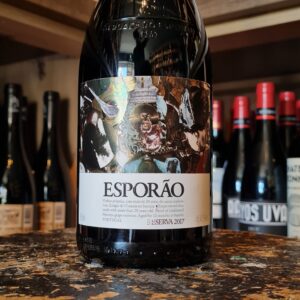 This is the first wine made by Esporão back in 1985. Label illustrated by António Poppe that changes with every organic vintage. Classic wine style made from estate grown grapes that shows the consistency and the rich, ripe fruit characters which are typical of the best Alentejo red wines. Deep dark red colour with intense spicy aroma of mature red berry fruits with discrete oak complexity. On the palate it is elegant, dense and creamy.
This is the first wine made by Esporão back in 1985. Label illustrated by António Poppe that changes with every organic vintage. Classic wine style made from estate grown grapes that shows the consistency and the rich, ripe fruit characters which are typical of the best Alentejo red wines. Deep dark red colour with intense spicy aroma of mature red berry fruits with discrete oak complexity. On the palate it is elegant, dense and creamy. -
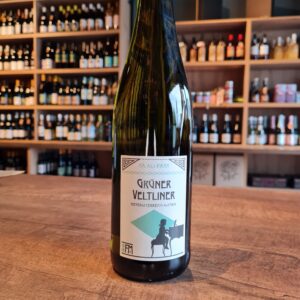 Gruner Veltliner is Austria’s most important indigenous grape and up until the 1990s it was relatively unheard of. Gruner Veltliner has many charms, one of them being the consistency of the quality and the flavour profile; it always delivers what it says on the tin. Ferdinand Mayr is a musician turned winemaker and his organic wines are singing with flavour and intensity. Whoever says Grüner Veltliner says Austria and vice versa. This version of Ferdinand Mayr is accessible and it charms you right away. Exuberant, lively nose of citrus, apple and white pepper. On the palate, the ripe fruit and spiciness create a pleasant tension with the acidity. Crispy and ripe, as if you were biting into a juicy apple. Flavor and spiciness characterize this wine. Fantastic with Japanese or Thai cuisine.
Gruner Veltliner is Austria’s most important indigenous grape and up until the 1990s it was relatively unheard of. Gruner Veltliner has many charms, one of them being the consistency of the quality and the flavour profile; it always delivers what it says on the tin. Ferdinand Mayr is a musician turned winemaker and his organic wines are singing with flavour and intensity. Whoever says Grüner Veltliner says Austria and vice versa. This version of Ferdinand Mayr is accessible and it charms you right away. Exuberant, lively nose of citrus, apple and white pepper. On the palate, the ripe fruit and spiciness create a pleasant tension with the acidity. Crispy and ripe, as if you were biting into a juicy apple. Flavor and spiciness characterize this wine. Fantastic with Japanese or Thai cuisine. -
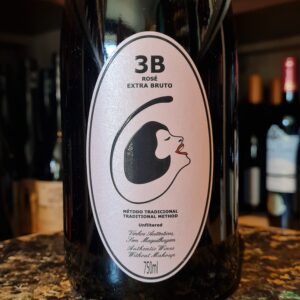 The Filipa Pato 3B Sparkling Rosé is a delicious treat of a wine from one of my favorite winemakers in Portugal. Filipa Pato is the daughter of arguably one of Portugal's most famous winemakers, Luis Pato. Passion for the traditional indigenous grape varietals of Bairrada led Filipa Pato to start her own project in 2001. She works a total of 12 hectares of vineyards scattered in various plots throughout the Bairrada appellation of Portugal. Utilizing biodynamic farming practices and minimal-intervention winemaking. The 3B is a homage to the traditional sparkling wines of Bairrada, with this being a blend of the indigenous Baga and Bical grapes. The Bical adds mineral and citrus notes to the berry red fruit notes of the Baga. This is a great little sparkler with a dry finish. Filipa and her husband, Belgian sommelier and restaurateur William Wouters, produce vinhos autênticos sem maquilagem – 'Authentic Wines Without Makeup.' 3B's-Bairrada, Baga & Bical
The Filipa Pato 3B Sparkling Rosé is a delicious treat of a wine from one of my favorite winemakers in Portugal. Filipa Pato is the daughter of arguably one of Portugal's most famous winemakers, Luis Pato. Passion for the traditional indigenous grape varietals of Bairrada led Filipa Pato to start her own project in 2001. She works a total of 12 hectares of vineyards scattered in various plots throughout the Bairrada appellation of Portugal. Utilizing biodynamic farming practices and minimal-intervention winemaking. The 3B is a homage to the traditional sparkling wines of Bairrada, with this being a blend of the indigenous Baga and Bical grapes. The Bical adds mineral and citrus notes to the berry red fruit notes of the Baga. This is a great little sparkler with a dry finish. Filipa and her husband, Belgian sommelier and restaurateur William Wouters, produce vinhos autênticos sem maquilagem – 'Authentic Wines Without Makeup.' 3B's-Bairrada, Baga & Bical -
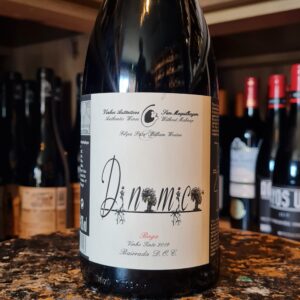 Filipa Pato is the confirmation of the old saying "son of fish knows how to swim". Although she followed the footsteps of her father Luís Pato, even in her academic training, Filipa always wanted to have her own world, her own project, where she would show her ideas, and go up with her own pulse. It was the 2001 harvest, a great year in Bairrada, which would provide all of this. That year, she decided to walk on her own feet, creating her dream. The success was immediate, and soon she rose to the status of one of the most brilliant winemakers in Portugal. The wines are the result of Filipa's innovative and brilliant spirit. They were quickly at the forefront of national and international criticism. In 2011, with her husband William Wouters, a prestigious Belgian Sommelier and owner of the Pazzo restaurant in Antwerp, Filipa receives the title "Newcomer of the year".
Filipa Pato is the confirmation of the old saying "son of fish knows how to swim". Although she followed the footsteps of her father Luís Pato, even in her academic training, Filipa always wanted to have her own world, her own project, where she would show her ideas, and go up with her own pulse. It was the 2001 harvest, a great year in Bairrada, which would provide all of this. That year, she decided to walk on her own feet, creating her dream. The success was immediate, and soon she rose to the status of one of the most brilliant winemakers in Portugal. The wines are the result of Filipa's innovative and brilliant spirit. They were quickly at the forefront of national and international criticism. In 2011, with her husband William Wouters, a prestigious Belgian Sommelier and owner of the Pazzo restaurant in Antwerp, Filipa receives the title "Newcomer of the year". -
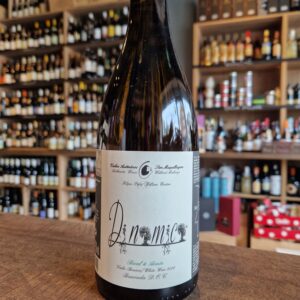 Filipa Pato and husband, William Wouters have created an expressive range of wines representing the native grape varietals of the Barriada region. Their philosophy is simple: "create authentic wines without make-up to express the true nature of the vineyards they come from". Bairrada is a coastal DOC which borders Vinho Verde, Dão and Lisboa. It has mild and wet winters and hot windy summers. The climatic thermal range, brought about by the Atlantic influence, brings high acidity and freshness to the grapes here. Filipa and William practice biodynamic viticulture and are undergoing conversion to organic certification. The wine is unfined. Drink with sheep and goats cheese, dressed salads, and delicate poultry dishes.
Filipa Pato and husband, William Wouters have created an expressive range of wines representing the native grape varietals of the Barriada region. Their philosophy is simple: "create authentic wines without make-up to express the true nature of the vineyards they come from". Bairrada is a coastal DOC which borders Vinho Verde, Dão and Lisboa. It has mild and wet winters and hot windy summers. The climatic thermal range, brought about by the Atlantic influence, brings high acidity and freshness to the grapes here. Filipa and William practice biodynamic viticulture and are undergoing conversion to organic certification. The wine is unfined. Drink with sheep and goats cheese, dressed salads, and delicate poultry dishes. -
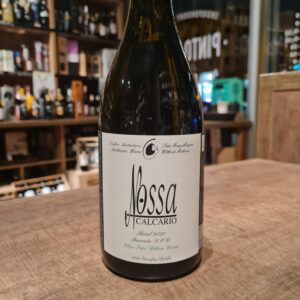 This mineral-driven white wine from Filipa Pato is akin to top quality white Burgundy. Using the Bical grape, the wine is aged in old French oak barrels and displays a great balance between creamy richness and lean minerality. Following in the footsteps in the winemaking traditions of her well-known father, Luis, Filipa Pato has now, in her own right, garnered a reputation for producing a superb range of wines in the heart of Bairrada, in Ois do Bairro. Focussing on Bairrada’s local native grape varieties, Filipa’s top-level white. It should be served not too cold, decanted into elegant glasses. It goes well with cheeses, fish dishes and salads.
This mineral-driven white wine from Filipa Pato is akin to top quality white Burgundy. Using the Bical grape, the wine is aged in old French oak barrels and displays a great balance between creamy richness and lean minerality. Following in the footsteps in the winemaking traditions of her well-known father, Luis, Filipa Pato has now, in her own right, garnered a reputation for producing a superb range of wines in the heart of Bairrada, in Ois do Bairro. Focussing on Bairrada’s local native grape varieties, Filipa’s top-level white. It should be served not too cold, decanted into elegant glasses. It goes well with cheeses, fish dishes and salads. -
Out of stock
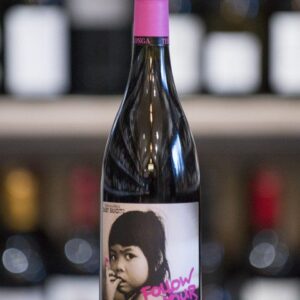 Craig and Carla Hawkins launched Testalonga in the north of Swartland, South Africa in 2008. They are part of a revolutionary ground swell taking place in South African wine, where traditions are being challenged and brave new territory is being explored. The painfully small amount of wine that this duo produces gets snapped up in short order the world over. Known for their striking intensity and nervy energy, Craig and Carla's wines are on the cutting edge of the natural wine movement in their country.This is the lightest, daintiest version of Carignan one could imagine. It's got more in common with, say a Jura rouge or something Cab-Franc-like out of the Loire Valley than a classic Rhone red.It's fresh, racy, filled with character and seasoned with a little wildness. Great with on summer afternoon, first courses, seasoned vegetables. Enjoy
Craig and Carla Hawkins launched Testalonga in the north of Swartland, South Africa in 2008. They are part of a revolutionary ground swell taking place in South African wine, where traditions are being challenged and brave new territory is being explored. The painfully small amount of wine that this duo produces gets snapped up in short order the world over. Known for their striking intensity and nervy energy, Craig and Carla's wines are on the cutting edge of the natural wine movement in their country.This is the lightest, daintiest version of Carignan one could imagine. It's got more in common with, say a Jura rouge or something Cab-Franc-like out of the Loire Valley than a classic Rhone red.It's fresh, racy, filled with character and seasoned with a little wildness. Great with on summer afternoon, first courses, seasoned vegetables. Enjoy -
Out of stock
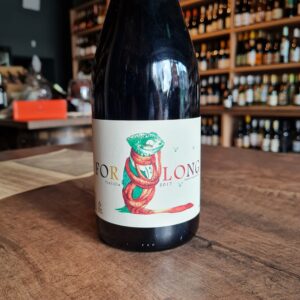 Fourth project of Bodegas Forlong (Cádiz). Vineyard consists of albariza soils in the Pago de “el Forlon” in Balbaina Baja, located in the coastal area of Puerto de Santa Maria, 7 km from the sea. Takes advantage of the proximity of the sea, and the purity of the albariza, as well as the local salt-peters which impart saline, chalky character to the grapes. The Tintilla de Rota grape, a native variety of the area, already existed on the farm along with the rest of the grapes, but they did not give it any value at the beginning, to the point that the first year they even gave it away. Once they discovered its potential "we almost pulled our hair at the thought that we had been giving it away." Has limited production of 2700 Bottles. As it is a native variety, they wanted to reflect it in some way on the label, and what better way than to put a native animal like the chameleon, which needs albariza soils that are easy to move to bury its eggs. Their long and rolled tongue is a reflection of Rocío and Alejandro's adventure of "rolling the blanket over their heads" when making a quality organic wine with Tintilla de Rota. Its vinification is carried out in clay jars, thus being a different wine. Pair it with entrecote steak, slow-cooked lamb, suckling pig, BBQ and grilled meats, porcini mushrooms, Jerusalem artichokes, hard cheeses, olives, jamón de pata negra.
Fourth project of Bodegas Forlong (Cádiz). Vineyard consists of albariza soils in the Pago de “el Forlon” in Balbaina Baja, located in the coastal area of Puerto de Santa Maria, 7 km from the sea. Takes advantage of the proximity of the sea, and the purity of the albariza, as well as the local salt-peters which impart saline, chalky character to the grapes. The Tintilla de Rota grape, a native variety of the area, already existed on the farm along with the rest of the grapes, but they did not give it any value at the beginning, to the point that the first year they even gave it away. Once they discovered its potential "we almost pulled our hair at the thought that we had been giving it away." Has limited production of 2700 Bottles. As it is a native variety, they wanted to reflect it in some way on the label, and what better way than to put a native animal like the chameleon, which needs albariza soils that are easy to move to bury its eggs. Their long and rolled tongue is a reflection of Rocío and Alejandro's adventure of "rolling the blanket over their heads" when making a quality organic wine with Tintilla de Rota. Its vinification is carried out in clay jars, thus being a different wine. Pair it with entrecote steak, slow-cooked lamb, suckling pig, BBQ and grilled meats, porcini mushrooms, Jerusalem artichokes, hard cheeses, olives, jamón de pata negra. -
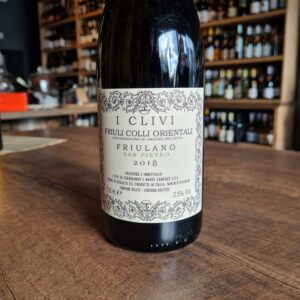 The wines of i Clivi are born in Friuli in between the Collio Goriziano and the eastern hills of Udine, named Colli Orientali, where, on sunny slopes – clivi meaning “slopes” – Altogether there is cultivated 12 hectares of certified organic vineyards planted with the indigenous varieties Ribolla, Friulano, Verduzzo, and Malvasia, whose only international grape is Merlot, a variety which found home in this area more than a century ago. Taking care of this important heritage of old vines, aged between 60 and 80 years, it is for Ferdinando and Mario Zanusso a reminder of the responsibility with which they guard and produce wine on this strip of land, giving the chance to express two distinct D.O.C. denominations, Collio, and Colli Orientali del Friuli, whose sensory difference is related exclusively to the microclimate. The low yields produced by these old vines give a natural concentration and complexity to the fruit they seek to transform naturally with spontaneous fermentation, maintaining the elegance and aromatic integrity through careful maturation in steel tanks for 50,000 bottles of varietal wines with great personality, distinguished grace, and delicacy.
The wines of i Clivi are born in Friuli in between the Collio Goriziano and the eastern hills of Udine, named Colli Orientali, where, on sunny slopes – clivi meaning “slopes” – Altogether there is cultivated 12 hectares of certified organic vineyards planted with the indigenous varieties Ribolla, Friulano, Verduzzo, and Malvasia, whose only international grape is Merlot, a variety which found home in this area more than a century ago. Taking care of this important heritage of old vines, aged between 60 and 80 years, it is for Ferdinando and Mario Zanusso a reminder of the responsibility with which they guard and produce wine on this strip of land, giving the chance to express two distinct D.O.C. denominations, Collio, and Colli Orientali del Friuli, whose sensory difference is related exclusively to the microclimate. The low yields produced by these old vines give a natural concentration and complexity to the fruit they seek to transform naturally with spontaneous fermentation, maintaining the elegance and aromatic integrity through careful maturation in steel tanks for 50,000 bottles of varietal wines with great personality, distinguished grace, and delicacy. -
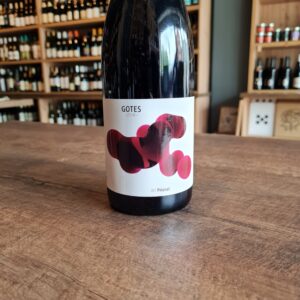 Gotes was the last to be incorporated into the Portal del Priorat's wine family, the Alfredo Arribas project in this denomination, and was envisioned to highlight the freshness of Priorat wines; gotes (drops) of freshness, like dewdrops. Don't expect to find in Gotes the more usual Priorat typicity, with profound maturity and intense minerality. Gotes reflects another type of Priorat wine, refined, in the French style (we mean 'French' as in Burgundy), with a fresh and floral profile. The typicity of Gotes is rooted in the countryside, in its notes of aromatic plants, and in that delightful warmth, because although fresh it is Mediterranean. Another special feature of Gotes is the polish and attention to detail it emits; it's an elegant wine; it has clearly been crafted by experts. If Gotes is refined on the nose, it's positively explosive on the palate! It grows and grows, with lots of volume and a very seductive sweetness and velvety texture. Gotes is fruit, but a very varied fruit cocktail: red fruits, black fruits, both fresh and jammy, the odd juicy stone fruit like mango (the Garnacha always leaves its mark) and fresh grapes that provide a citrusy touch. Ideal with dishes of a upper middle power taste. Will be excellent with a salad of figs and duck ham with Parmesan shavings. It will also be great taking with red meats, duck breast grilled or thigh kid with cider and soft alioli.
Gotes was the last to be incorporated into the Portal del Priorat's wine family, the Alfredo Arribas project in this denomination, and was envisioned to highlight the freshness of Priorat wines; gotes (drops) of freshness, like dewdrops. Don't expect to find in Gotes the more usual Priorat typicity, with profound maturity and intense minerality. Gotes reflects another type of Priorat wine, refined, in the French style (we mean 'French' as in Burgundy), with a fresh and floral profile. The typicity of Gotes is rooted in the countryside, in its notes of aromatic plants, and in that delightful warmth, because although fresh it is Mediterranean. Another special feature of Gotes is the polish and attention to detail it emits; it's an elegant wine; it has clearly been crafted by experts. If Gotes is refined on the nose, it's positively explosive on the palate! It grows and grows, with lots of volume and a very seductive sweetness and velvety texture. Gotes is fruit, but a very varied fruit cocktail: red fruits, black fruits, both fresh and jammy, the odd juicy stone fruit like mango (the Garnacha always leaves its mark) and fresh grapes that provide a citrusy touch. Ideal with dishes of a upper middle power taste. Will be excellent with a salad of figs and duck ham with Parmesan shavings. It will also be great taking with red meats, duck breast grilled or thigh kid with cider and soft alioli. -
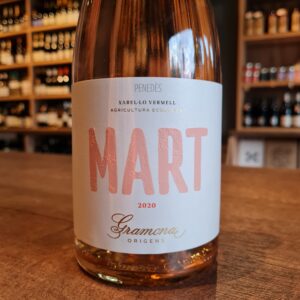 Biodynamic Rosé made from pink skinned Xarel.lo – a variety indigenous to the Penedès region that has been brought back from the brink of extinction. Mediterranean fruits and herbs. Delicate and complex. Recommended spicy dishes such as those found in Japanese, Nikkei, Caribbean and South American cuisine. Rice dishes and seafood. Excellent for aperitifs.
Biodynamic Rosé made from pink skinned Xarel.lo – a variety indigenous to the Penedès region that has been brought back from the brink of extinction. Mediterranean fruits and herbs. Delicate and complex. Recommended spicy dishes such as those found in Japanese, Nikkei, Caribbean and South American cuisine. Rice dishes and seafood. Excellent for aperitifs. -
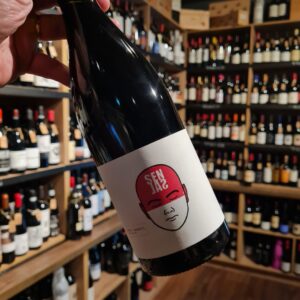 Javier Revert Viticultor is the personal project of Javi Revert, oenologist and part of the technical team of Celler del Roure since 2009. It all started in 2014, when Javier started to recover a vineyard planted by his great-grandfather in the highest area of Font de la Figuera, an area influenced by the Mediterranean character and the harsh winter of La Mancha. It was in the 2016 vintage when their first wines were launched. Javier Revert is one of the young winemakers who tries to interpret the landscape, looking for the best orientations, recovering abandoned vineyards and planting new ones with historical varieties from the area. Javier Revert Sensal is a red wine made with Red Grenache and Monastrell from a 0.8-hectare vineyard with the same name planted in 1965 at 700 metres of altitude on clayey, fresh and slightly clayey soils. Rice dishes, White meats, Charcuterie, Red meat
Javier Revert Viticultor is the personal project of Javi Revert, oenologist and part of the technical team of Celler del Roure since 2009. It all started in 2014, when Javier started to recover a vineyard planted by his great-grandfather in the highest area of Font de la Figuera, an area influenced by the Mediterranean character and the harsh winter of La Mancha. It was in the 2016 vintage when their first wines were launched. Javier Revert is one of the young winemakers who tries to interpret the landscape, looking for the best orientations, recovering abandoned vineyards and planting new ones with historical varieties from the area. Javier Revert Sensal is a red wine made with Red Grenache and Monastrell from a 0.8-hectare vineyard with the same name planted in 1965 at 700 metres of altitude on clayey, fresh and slightly clayey soils. Rice dishes, White meats, Charcuterie, Red meat -
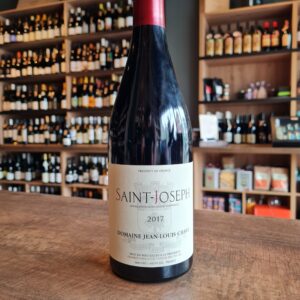 Since 1481, the Chave family has been lording the soils of the Hermitage. Probably they are amongst the best visionaries and observers of the French wines in general. The vineyards are cultivated organically, with methods that favor very low yields and full ripeness, followed by minimal intervention in the winemaking process. The family's pride and joy is the Syrah planted on the fabled hill of Hermitage, but their wines from Saint-Joseph, a small nearby village devoted to the same grape, are a close second and represent distinct value. Syrah here doesn't taste like the bombastic syrah of California or Australia; rather, it's smoky, savory, and tastes like blackberries and black pepper.
Since 1481, the Chave family has been lording the soils of the Hermitage. Probably they are amongst the best visionaries and observers of the French wines in general. The vineyards are cultivated organically, with methods that favor very low yields and full ripeness, followed by minimal intervention in the winemaking process. The family's pride and joy is the Syrah planted on the fabled hill of Hermitage, but their wines from Saint-Joseph, a small nearby village devoted to the same grape, are a close second and represent distinct value. Syrah here doesn't taste like the bombastic syrah of California or Australia; rather, it's smoky, savory, and tastes like blackberries and black pepper.

